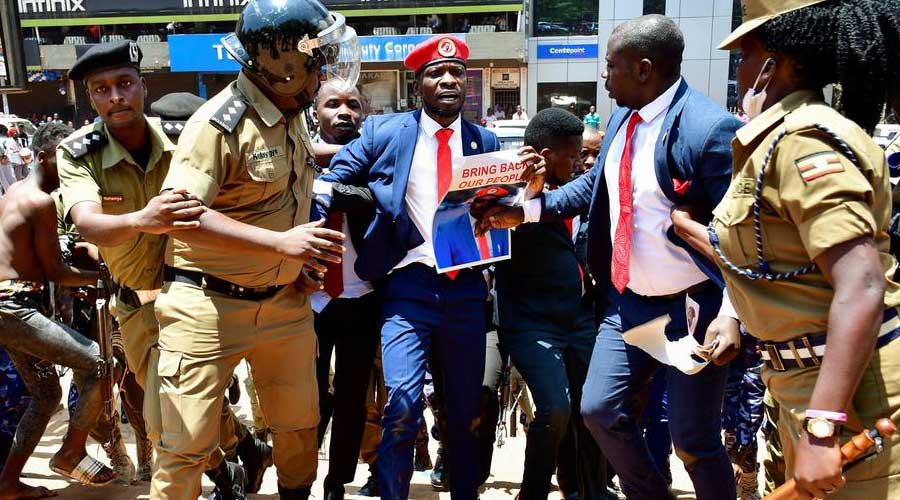Ugandan musician and politician Bobi Wine says culture can flourish with freedom. He was part of a group of African artists invited to a DW panel to discuss opportunities for Africa's creative scene."Freedom comes to those who fight, but not to those who cry, coz the more you cry, the more your people continue to die, so rise and defend your rights!"
With these lines from his song "Time Bomb," Bobi Wine opened a panel this week at the invitation of DW culture editors within the framework of the annual Global Media Forum.
In his native Uganda, Wine could end up in prison for that statement. Since 2018, Robert Ssentamu Kyagulanyi — his real name — has been blacklisted as an "abolished artist" in Uganda.
"I'm not supposed to stage a concert and neither is my music supposed to play on radio or TV," he said.
Active in politics since 2017, Bobi Wine is a thorn in the side of Uganda's government. He opposes President Yoweri Museveni, who has ruled for the past 36 years. In 2021, Wine ran as a presidential candidate despite attempts at intimidation — he has been repeatedly arrested and tortured in recent years.
He lost the election, and he and his family were placed under house arrest for months. The fact that he is still alive at all may be because the government wants to uphold the narrative, at least to the international community, that opposition is possible.
But Wine does not want to leave his country, because that would "be betrayal — betrayal of myself and my people. And it would not make practical sense at the end of the day," he told DW.
"The tyrants that rule some countries in Africa [...] can pick you from any part of the world and kill you," he said. "So, other than making it hard for my people, they would rather kill me from home. I don't want to make it expensive for my family to carry my body from wherever and take it back home. That's Uganda — it's where I'm born and it's where I'm going to buried at the end of the day."
Is going into exile the only way?
Stella Gaitano, a writer from neighboring South Sudan, decided to go into exile. She, too, was persecuted and arrested several times for writing texts that denounced warmongering in her region.
The Sudanese-born author participated in protests against former strongman and autocrat Omar al-Bashir, who was overthrown by the military in 2019. She is also involved in various NGOs that provide food donations as well as books to refugees and displaced people.
Change needs education, she argued.
"Dreaming about countries is not enough. We have to work and we have to build ourselves first — then we can build our countries," she said.
Gaitano prepared her children for the possibility that she might have to flee one day. "That made me strong and that made them strong," said the author, who has been living in the town of Kamen in the western German state of North Rhine-Westphalia since March 2022. She is a fellow of the PEN writers' association Writers-in-Exile program, but with her ex-husband in Sudan, her three sons are waiting for visas to join their mother.
Ike Nnaebue from Nigeria wanted to leave his homeland more than 20 years ago to seek his fortune in Europe. He had already got as far as Mali when tales of the dangers of the journey made him change his mind. Today, Nnaebue is a celebrated Nigerian filmmaker. His documentary "No U-Turn" received special mention at the Berlin Film Festival this year.
"As artists, we have very big responsibility," he told DW. "Part of our work is holding a mirror to society and pointing society in the right direction."
"The job for us as creatives from Africa, from West Africa and especially from Nigeria is to show what is possible, to show that people can dream from wherever they are," he said.
He believes this is a good time for filmmakers in Nigeria because people want to hear about "everyday heroes of everyday life ... stories that show the magic of the people."
Artworks on the road
Angele Etoundi Essamba, a photographer from Cameroon, captures that magic, too.
"I wanted to break all the stereotypes that surrounded the representation not only of Africa, but of African women," said Essamba, whose works are being added to the permanent collection of New York's Museum of Modern Art.
Essamba is convinced that art can bring about change. In the last 20 years, she said, African art has become increasingly in demand, which has clearly also benefited the artists.
"It's really a very good time for African artists," said Akinbode Akinbiyi, a British-Nigerian photographer, adding that "from the continent, things are really moving forward." Settled in Berlin, Akinbiyi regularly travels to Africa to give workshops. Be passionate about what you do — that is the advice he gives young students.
The five guests in the DW panel don't lack passion. In the face of censorship, conflicts and a lack of financial resources, they are convinced that, thanks to art, social change is possible.
"Art is a soft power," said Stella Gaitano.











